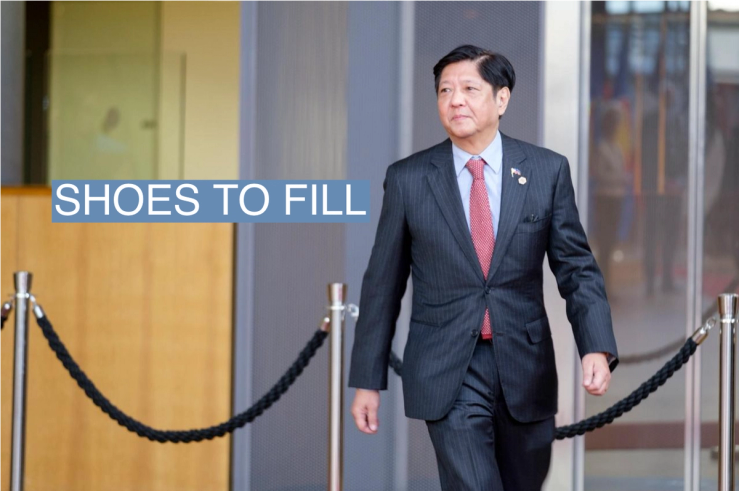The News
Thirty-seven years ago, Ronald Reagan’s administration advised Philippine dictator Ferdinand Marcos to “cut, and cut cleanly,” in the face of a “People Power” revolution that ultimately swept him from Malacañang Palace. Marcos found exile in Hawaii with his family and only son, Ferdinand “Bongbong” Jr.
But in one of Asia’s more remarkable political resurrections, Bongbong is coming to the U.S. for an official White House visit in which he’ll meet President Joe Biden on Monday. The 65-year-old was sworn in as the Philippines’ 17th president last June.
Senior U.S. officials on Sunday said they’ll use Marcos’s visit to fortify the 1951 Mutual Defense Treaty that calls for each country to protect the other at the time of an attack. This will include announcing steps to strengthen the Philippine military through the transfer of U.S. naval and air assets to Manila and the investing of $100 million into four joint-U.S.-Philippine military bases that sit astride the South China Sea.
Washington and Manila are also building out new lines of mutual defense such as in cyber and maritime security. “We are very committed to the Mutual Defense Treaty, as is the Philippine government,” said a senior U.S. official working on Marcos’s trip.
In this article:
Jay’s view
Marcos’s domestic revival has much to do with the Philippine’s tradition of dynastic politics. But his warm welcome by the Biden team is being driven by the U.S.‘s fixation on the potential threat from China and Manila’s envisaged role as a key partner in countering it.
Marcos’s predecessor, Rodrigo Duterte, publicly tilted toward Beijing for much of his term and considered revoking the Mutual Defense Treaty with Washington. But Marcos has re-embraced the U.S. since taking office and signaled his shared view of the China challenge. The four new joint military bases he has greenlighted, on the islands of Luzon and Palawan, could serve as critical basing and supply sites for the U.S. in any conflict with China over Taiwan.
Marcos’s shift is driven by a mix of security demands and domestic, as well as personal, politics. Beijing has increasingly challenged the Philippine’s territorial claims in the South China Sea, forcing Manila to seek international arbitration at one stage — which it won. Even Duterte appeared to cool on Beijing at the end of his tenure.
Still, standing up to China has also helped the Philippines’ new leader rebuild his family name — which was long associated with large-scale corruption and lavish spending, symbolized by his mother Imelda Marcos’ world famous shoe collection. Many diplomats doubt Marcos would have received an official visit in Washington without providing the U.S. with such enthusiastic military cooperation on China.
Marcos’s American turn has drawn China’s ire. Beijing’s ambassador to Manila recently accused Marcos of “stoking the fire” of a conflict in East Asia, and China’s military is increasingly harassing Philippine naval vessels in the disputed South China Sea, with one such confrontation making international headlines last month. In turn, Marcos is seeking more protection from American friends.
And Biden is signaling he’ll give it. The State Department publicly warned China on Saturday against threatening Philippine forces in territorial waters and said Beijing is being monitored. “Imagery and video recently published in the media is a stark reminder of [China’s] harassment and intimidation of Philippine vessels as they undertake routine patrols within their exclusive economic zone,” said spokesman Matthew Miller. “We call upon Beijing to desist from its provocative and unsafe conduct.”
Know More
Marcos’s visit this week is also just the latest step in the Biden administration’s dizzying diplomatic effort to unify the U.S. and its indo-Pacific allies in the face of China’s military expansion.
Last week, Biden hosted South Korean President Yoon Suk Yeol in Washington where they unveiled a new defense pact aimed at better coordinating a nuclear response to North Korea. Later in May, Biden will meet Japanese Prime Minister Fumio Kishida in Tokyo and then travel to Australia for a convening of the leaders of the Quad countries — the U.S., Australia, Japan and India. U.S. officials said Sunday that China will be at the center of all this diplomacy.
Step Back
The United States and Marcos family remain highly contentious in the Philippines, even though the current president won in a landslide last year. The leader’s father was found to have committed massive human rights violations during his decades of authoritarian rule.
The Philippines is the only country the U.S. has ever formally colonized. Few Americans know of the brutal campaign the U.S. waged in the early 1900s to take control of the country — a conflict that birthed the Colt 45 revolver. The U.S. and Japan also fought brutal battles across the archipelago during the Second World War, driving General Douglas MacArthur out of Manila Bay at one stage.
The alliance endured during the Vietnam war and U.S. global campaign against communism. But Philippine politicians voted to close two major U.S. bases on Luzon — Clark Air Base and the naval base at Subic Bay — in 1991. (Full disclosure: My father was the U.S. ambassador in Manila at the time). And the Philippines had sought strong relations with China as it emerged as a major global economic engine and made major investments in the country.
Some Filipinos also worry that their country is again becoming a vassal of the U.S., and could be caught between Washington and Beijing. “The Philippines, thanks in no small measure to Marcos Jr., has returned to its unenviable status as a strategic possession of the United States,” wrote the Philippine academic and former congressman, Walden Bello.
Room for Disagreement
Bello argues that Marcos’ turn to the U.S. may be less about strategic concerns than his own financial wellbeing, since he still faces a contempt of court judgment in the U.S. for failing to pay $353 million in a lawsuit related to abuses committed by his father.
“With this veritable sword of Damocles hanging over him, Marcos Jr., is not someone who would dare cross Washington,” he writes. “Indeed, when it comes to negotiating an independent path between two superpowers, he is the wrong person at the wrong place at the wrong time.”
Notable
- In 2022, the BBC explored how Marcos and his supporters leveraged Social Media to rewrite the history of his family’s reign among Filipino voters as he went on to a commanding electoral victory.
- Stanley Karnow wrote a Pulitzer Prize-winning history of the U.S.’s colonial experience in the Philippines, “In Our Image.”


